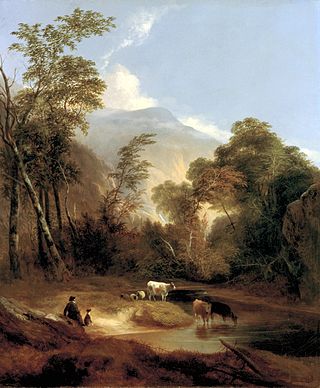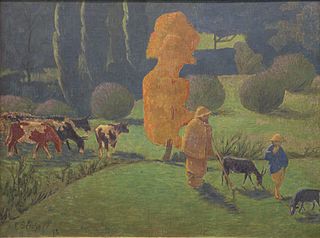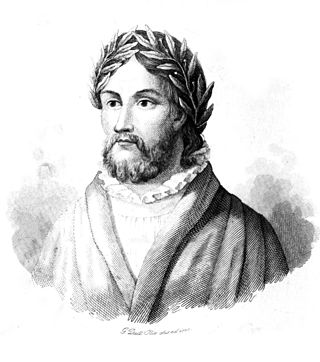Related Research Articles

Publius Vergilius Maro, usually called Virgil or Vergil in English, was an ancient Roman poet of the Augustan period. He composed three of the most famous poems in Latin literature: the Eclogues, the Georgics, and the epic Aeneid. A number of minor poems, collected in the Appendix Vergiliana, were attributed to him in ancient times, but modern scholars consider his authorship of these poems as dubious.

Marcus Annaeus Lucanus, better known in English as Lucan, was a Roman poet, born in Corduba, in Hispania Baetica. He is regarded as one of the outstanding figures of the Imperial Latin period, known in particular for his epic Pharsalia. His youth and speed of composition set him apart from other poets.
Gaius Calpurnius Piso was a Roman senator in the first century. He was the focal figure in the Pisonian conspiracy of AD 65, the most famous and wide-ranging plot against the throne of Emperor Nero.

Jacopo Sannazaro was an Italian poet, humanist and epigrammist from Naples.

A pastoral lifestyle is that of shepherds herding livestock around open areas of land according to seasons and the changing availability of water and pasture. It lends its name to a genre of literature, art, and music (pastorale) that depicts such life in an idealized manner, typically for urban audiences. A pastoral is a work of this genre, also known as bucolic, from the Greek βουκολικόν, from βουκόλος, meaning a cowherd.
An eclogue is a poem in a classical style on a pastoral subject. Poems in the genre are sometimes also called bucolics.
GrattiusFaliscus was a Roman poet who flourished during the life of Augustus. He is known as the author of a Cynegeticon, a poem on hunting.
Marcus Aurelius Olympius Nemesianus was a Roman poet thought to have been a native of Carthage and flourished about AD 283. He was a popular poet at the court of the Roman emperor Carus.

The Eclogues, also called the Bucolics, is the first of the three major works of the Latin poet Virgil.
Saleius Bassus was a Roman epic poet. He lived during the reign of Vespasian, being a contemporary of Gaius Valerius Flaccus.

The gens Calpurnia was a plebeian family at ancient Rome, which first appears in history during the third century BC. The first of the gens to obtain the consulship was Gaius Calpurnius Piso in 180 BC, but from this time their consulships were very frequent, and the family of the Pisones became one of the most illustrious in the Roman state. Two important pieces of Republican legislation, the lex Calpurnia of 149 BC and lex Acilia Calpurnia of 67 BC were passed by members of the gens.

Corydon is a stock name for a shepherd in ancient Greek pastoral poems and fables, such as the one in Idyll 4 of the Syracusan poet Theocritus. The name was used by the Latin poets Siculus and, more significantly, Virgil. In the second of Virgil's Eclogues, it is used for a shepherd whose love for the boy Alexis is described therein. Virgil's Corydon gives his name to the modern book Corydon.
The Laus Pisonis is a Latin verse panegyric of the 1st century AD in praise of a man of the Piso family. The exact identity of the subject is not completely certain, but current scholarly consensus identifies him with Gaius Calpurnius Piso, the leader of a conspiracy against Nero in AD 65. The Latinity is straightforward; the subject is praised for his oratorical ability as an advocate in law cases, for the kindness with which he maintains his house open to poor men of talent, but also for his skill at playing ball and especially the board game of latrunculi, for which the poem is one of our main sources.

Publio Fausto Andrelini was an Italian humanist poet, an intimate friend of Erasmus in the 1490s, who spread the New Learning in France. He taught at the University of Paris as "professor of humanity" from 1489, and became a court poet in the circle around Anne of Brittany, the queen to two kings.
Moduin, Modoin, or Mautwin was a Frankish churchman and Latin poet of the Carolingian Renaissance. He was a close friend of Theodulf of Orléans, a contemporary and courtier of the emperors Charlemagne and Louis the Pious, and a member of the Palatine Academy. In signing his own poems he used the pen name Naso in reference to the cognomen of Ovid. From 815 until his death he was the Bishop of Autun.

Eclogue4, also known as the FourthEclogue, is the name of a Latin poem by the Roman poet Virgil.
The Eclogues is a collection of Latin poetry attributed to Calpurnius Siculus and inspired by the similarly named poems of the Augustan-age poet Virgil.
The Eclogues is a book of four Latin poems, attributed to Marcus Aurelius Olympius Nemesianus.
The Einsiedeln Eclogues are two Latin pastoral poems, written in hexameters. They were discovered in a tenth century manuscript from Einsiedeln Abbey and first published in 1869, by H. Hagen.
The Cynegetica is a didactic Latin poem about hunting by Marcus Aurelius Olympius Nemesianus. The poem is usually dated to 283/284 A.D. - as it refers to the reign of the Roman Emperors Carinus and Numerian.
References
- 1 2 3 4 5 6 One or more of the preceding sentences incorporates text from a publication now in the public domain : Freese, John Henry (1911). "Calpurnius, Titus". In Chisholm, Hugh (ed.). Encyclopædia Britannica . Vol. 5 (11th ed.). Cambridge University Press. pp. 68–69.
- ↑ Haupt, M. (1854) De Carminibus Bucolicis Calpurnii et Nemesiani.
- ↑ Champlin, E. (1978) The Life and Times of Calpurnius Siculus, JRS 68: 95 -110.
- ↑ "Calpurnius Siculus" Oxford Classical Dictionary, 3rd edition
- ↑ Townend, G.B. (1980) "Calpurnius Siculus and the Munus Neronis", JRS 70:166-74; Mayer, R. (1980) "Calpurnius Siculus: Technique and Date", JRS 70: 175-76.
- ↑ Armstrong, D. (1986) "Stylistics and the Date of Calpurnius Siculus", Philologus 130: 113-36; Courtney, E. (1987) "Imitation, Chronologie Litteraire et Calpurnius Siculus", REL 65: 148-57